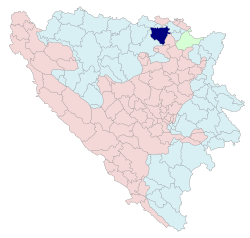Modriča
| Modriča Модрича | ||
|---|---|---|
| Town and municipality | ||
 View on Modriča | ||
| ||
 Location of Modriča within Republika Srpska | ||
| Coordinates: 44°57′24″N 18°18′54″E / 44.95667°N 18.31500°ECoordinates: 44°57′24″N 18°18′54″E / 44.95667°N 18.31500°E | ||
| Country | Bosnia and Herzegovina | |
| Entity | Republika Srpska | |
| Government | ||
| • Mayor | Mladen Krekić (SNSD)[1] | |
| • Municipality | 319.8 km2 (123.5 sq mi) | |
| Population (2013 census) | ||
| • Town | 10,137 | |
| • Municipality | 25,712 | |
| • Municipality density | 80/km2 (210/sq mi) | |
| Time zone | UTC+1 (CET) | |
| • Summer (DST) | UTC+2 (CEST) | |
| Postal code | 74480 | |
| Area code(s) | +387 53 | |
| Website |
www | |
Modriča (Serbian Cyrillic: Модрича) is a town and municipality located in Republika Srpska, an entity of Bosnia and Herzegovina. It is located near the towns of Šamac, Derventa and Doboj. As of 2013, the town has a population of 10,137 inhabitants, while the municipality has 25,712 inhabitants.
History
The first written document about Modriča is 13th century charter of Hungarian King Bela IV in which Modriča is mentioned as spring: "...fons Modricha, ubi cadit in Boznam “, but it all indicates that it was minor stream which was flowing into Bosna river. According to traditional stories, Modriča was named after the small river with blue, mountain water. It is assumed that the small river is Dusa. According to other narratives, area bears the name of the old Slavic marks of the blue sky and distances, which are more discerned on the horizon than visible – modrina (the blue)/modriča.
There is archaeological evidence of human presence in the territory of present-day Modrica municipality back in the Paleolithic - Old Stone Age. This is evidenced by traces discovered at the site Gradina in the village of Dugo Polje above the valley of Bosna river. Traces of ancient Neolithic farmers were found in several places, among others at locations Kulište in Kruskovo Polje, at Zdralovo brdo in village Kladari, at location Prljaca, then in villages Vranjak, Kuznjaca, Skugric, Dugo Polje, etc. At Dobor hill is important site with seven archaeological layers of the Iron Age. Traces of old Slavic settlements can be found in several places in Modrica municipality. In the charter of Kotromanic from 1323 mentioned is parish Nenaviste with settlements Modrica and Jakes.
The events were developing around Dobor fortress which presage the end of the Bosnian national independence. Those were conflicts with Hungarians in 1393/94 and 1408th, and the cut of 170 Bosnian boyars on the ramparts of the fort. These areas then became cruel war frontier in a fit of the Turks, and they won Dobor and Modrica in the 1536th. After the defeat of the Turks at Vienna 1683rd, in the next two centuries this was the border area, and that means - the zone of conflicts, rebellions, devastation and economic stagnation. During Austrian-Hungarian rule, in 1897 Modrica has been included in list of such towns that Bosnia and Herzegovina had only 66.
In the second half of the 19th century economic and cultural - educational conditions are slowly improving. Memory was recorded that school existed, maybe even at the end of the 18th century, and in any case from the second half of the 19th century. Modrica was a nursery of schools in the rural area. From 1929-39, Modriča was part of the Vrbas Banovina and from 1939-41 of the Banovina of Croatia within the Kingdom of Yugoslavia.
After the 1992–95 Bosnian War, prewar municipal borders were changed, villages of Jakeš, Pećnik and Modrički Lug were excluded from Modriča and included in new Vukosavlje municipality, and a few villages from the western part of prewar Gradačac municipality were included, thus the size of the municipality changed substantially.
Demographics
| Historical population | ||
|---|---|---|
| Year | Pop. | ±% p.a. |
| 1948 | 19,746 | — |
| 1953 | 39,156 | +14.67% |
| 1971 | 31,622 | −1.18% |
| 1981 | 34,541 | +0.89% |
| 1991 | 35,413 | +0.25% |
| 2013 | 25,720 | −1.44% |
According to the 2013 census, the municipality of Modriča has a population of 25,720 inhabitants.
Ethnic groups
The ethnic composition of the municipality:
| Ethnic group | Population 1971 |
Population 1991[2] |
Population 2013[3] |
|---|---|---|---|
| Serbs | 13,457 | 12,564 | 20,227 |
| Croats | 9,418 | 1,660 | 1,674 |
| Bosniaks/Muslims | 8,356 | 16,992 | 3,101 |
| Yugoslavs | 180 | 1,813 | - |
| Others | 211 | 2,384 | 718 |
| Total | 31,622 | 35,413 | 25,720 |
Economy

The Modriča oil refinery, currently owned by Russian investors, is located in Modriča.
Sports
- FK Modriča plays in the First League of the Republika Srpska
- The local volleyball club is Modriča Optima.
Twin towns – sister cities
Modriča is twinned with:
Notable people
- Avdo Karabegović - Hasanbegov, poet
- Marta Savić, singer
- Kristian Kreković, painter
- Milan Jelić, President of Republika Srpska
- Nikola Nikić, footballer
- Nada Topčagić, singer
- Zdravko Kuzmanović, footballer
- Jusuf Dajić, footballer
See also
References
- ↑ "Archived copy" (PDF). Archived from the original (PDF) on 2006-12-21. Retrieved 2006-12-21.
- ↑ "Bosnian Congres - census 1991 - North of Bosnia". Hdmagazine.com. Archived from the original on 13 June 2013. Retrieved 24 November 2015.
- ↑ "POPIS STANOVNIŠTVA, DOMAĆINSTAVA I STANOVA U BOSNI I HERCEGOVINI, 2013. REZULTATI POPISA" (PDF). popis2013.ba (in Serbian). Retrieved 15 December 2016.
External links
| Wikimedia Commons has media related to Modriča. |
